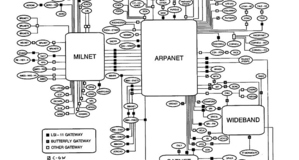From Interstate - Journal of International Affairs VOL. 2015/2016 NO. 2Crossed Wires: International Cooperation on Cyber Security
IN THIS ARTICLE
KEYWORDS
IntroductionCyber security is a compelling problem for scholars of International Politics. Internet technology is so thoroughly integrated into civil society, commerce, governance, critical infrastructures, intelligence collection and law enforcement that the stakeholders necessary to cyber security practices and policies are diverse and complex. This produces a collision of interests, agendas and expectations – that can often be incompatible or even in direct conflict. And of course, some aspects of the Internet can be quite independent of geographic and political borders. Although cyber security is quite clearly a ‘post-state' problem, it has actually proven very difficult to move beyond a Westphalian conception of either the problem or the possible solutions. This leads to a central paradox about cyber security as we currently conceive it: on the one hand, it appears to be a problem that cannot be dealt with effectively by state instruments like the military or law enforcement but despite that, there remains a strong expectation that the state retains responsibility for providing security in this realm. This paradox has led to an emphasis in cyber security policy documents on the imperative for international cooperation.1 At first glance, it might appear intuitive that states would seek to cooperate on cyber security. In the context of the globalisation literature of the past two decades, transnational and non-traditional security concerns have frequently been discussed as transcending state capabilities2 and even as a catalyst for enhanced cooperation.3 However, despite this clear emphasis on international cooperation on cyber security and the assertions that not only is the threat imminent but a solution is in everyone's best interest, progress on this front has been slow. Analysis of the impediments to greater cooperation has largely been the domain of the technical and legal sectors. However, after 25 years of looking for solutions through these two lenses (often in isolation of one another) it is becoming clear that cyber security is not simply a technical problem. Rather, there are considerable political elements to this that need to be much more closely examined and understood. In order to highlight some of the political factors that impede greater progress on international cooperation in this context this paper provides a brief overview of two mechanisms for state to state cooperation on cyber security; NATO and the Council of Europe Convention on Cybercrime. These two mechanisms are useful for this analysis for two reasons; first, both have been in existence long enough to provide a platform for discussion of the range of political factors that might help to explain the reasons why states have not cooperated more comprehensively on this issue. The second reason why they are useful examples is because of their very different origins. NATO is a pre-existing security arrangement that is working to adapt to the Information Age. The 2007 attacks on Estonia made it clear that Article Five of the NATO charter is ill-equipped to address cyber attacks and it prompted a concerted effort to explore the implications of cyber security for future cooperation between member states. Looking at NATO provides some insight into the challenges of incorporating concepts of ‘cyberwar' into conventional military based security arrangements. In contrast, the Council of Europe Convention on Cybercrime (also referred to as the Budapest Convention) is an example of a more recently established mechanism for state to state cooperation specifically on cyber security.4 It is open to ratification by any country – in or outside of Europe. Predominantly a mechanism for aligning legal regimes, its uptake has been slow and limited. While technical capability and legal factors are certainly part of the explanation for this, this paper argues that a lack of political will has also been a significant impediment to greater cooperation. This is a question that warrants significant research and it cannot be dealt with in a short paper like this one. Instead, this article sets out the problem of international cooperation through both pre-existing and purpose built security arrangements and proposes some of the factors for consideration and further research. Most significant here is the need to consider more carefully the implications of attribution problems for international relations, the utility of conceptualising cyber security as ‘war' and the expectations of less powerful states that they have a greater role in the promotion of values through international law. NATOIn April 2007, a diplomatic stoush between Russia and Estonia resulted in a Distributed Denial of Service (DDoS) attack on Estonian critical infrastructure. Involving over a million computers around the world, primary targets were the websites of the Estonian President and Parliament, three of the country's six news services, two of its largest banks and several communications firms.5 Estonia's Defence Minister Jaak Aaviksoo declared a national security situation which could "effectively be compared to when your ports are shut to the sea".6 Relations between Russia and Estonia deteriorated quickly with Estonia turning to its NATO allies for assistance in what they believed was an act of state-to-state belligerence. NATO responded by acknowledging that the attacks fell within the purview of the alliance relationship and should elicit support.7 However, Article Five of the NATO treaty – the ‘tripwire' for collective response by NATO members to an attack on a member country – was not then understood to define cyber-attacks as military action.8 After three weeks of sustained attacks, Estonia was forced to isolate itself from Internet traffic beyond its borders in order to restore its systems and the attacks subsequently died off.9 This incident served to highlight two important elements of conceptualising cyber security in a state security context. First, industrialised, developed states are disproportionately vulnerable to cyber threats and this disrupts longstanding beliefs in IR about the relationship between technology and power.10 Even in 2007, Estonians relied heavily on their critical information infrastructure with many commercial, civilian and governmental functions taking place solely online. The disruption to Internet access impacted Estonia in a way that it would not (even today) impact many of the world's states where penetration rates, and therefore reliance are too low. Additionally, in a global order with vastly uneven distribution of capabilities, there is a growing expectation that those political actors with access to few conventional military resources may be attracted to the asymmetric potential of cyber weapons.11 The second important element that this incident brought to the fore was the challenge for collective security arrangements like NATO of synthesising existing concepts of kinetic war to threats particular to the Information Age. Understanding these fully will be the work of a generation of scholars and practitioners but beginning to articulate some of the disjuncture between our conceptions of political violence pre and post Internet technology is a starting point. In this case, there are two points worth enunciating; first, the problems surrounding retaliation and second, the uneasy fit of ‘war' with ‘cyber'. Attribution and RetaliationRetaliation by use of kinetic or electronic force is deeply problematic as a response to cyber attacks. In large part, this is a consequence of the challenge of attribution – or accurately identifying the source of an attack that comes across the Internet. Although (post Snowden) we should all be familiar with how much data is collected about our online transactions and how sophisticated tracking practices are, for those who are determined and skilled, masking the origin of an attack is still possible. Despite the widespread attention it attracted from security firms, even the Estonian DDoS attack has never been conclusively attributed. It will probably always remain unclear whether that attack was initiated by a determined group of individuals (with or without some degree of support from the Russian state) or if it was a state led attack.12 This problem of attribution means that any response is problematic. If we were to consider responding to states from which an attack appears to emerge, we would have to consider the potential for being deliberately misled. In the context of a pre-existing political tension like Estonia (or the Straits of Taiwan, the Middle East etc), those with an interest in conflict escalation could conceivably use a cyber attack to prompt a kinetic response. This creates a kind of ‘digital fog of war' which has implications for trust in international relations. The role of trust in international cooperation has attracted significant scholarly attention – often in the context of adherence to arms treaties.13 Although much of the literature around cyber security falls back on concepts and frameworks developed in the context of kinetic weapons, the problem of attribution on the Internet seriously undermines the potential for trusting relationships because it renders transparency and accountability so difficult. Computer forensics focuses on Internet Protocol (IP) addresses. This can, if an investigation is successful, lead to the identification of a computer involved in an attack. However, that does not in itself identify the person behind the attack. This means that state actors could continue to break the terms of an agreement with some hope of avoiding detection but it also means that there is potential to design attacks so that they appear to come from a particular state. This ambiguity of the origins of cyber attacks leads to a condition of ‘plausible deniability' – states may use the difficulties of attribution to their advantage, but this makes it difficult to establish trust. Is Cyber War ‘War'?The second important disjuncture that emerged through this challenge for NATO as a collective security instrument was how (or whether) the concept of war could be applied to cyber attacks. The literature on cyber war is polarised. Some people like Richard Clarke (former US ‘cyber czar') argue that it is a matter of ‘when' rather than ‘if' we will experience a significant incident that can be understood as cyber war.14 At the other end of the spectrum, Thomas Rid suggests that when we look closely at cyber attacks in the context of the state, rather than anything resembling war, we see ‘three activities that are as old as human conflict itself: sabotage, espionage and subversion'.15 He argues that emphasis on these practices is reducing the reliance on physical violence. There is plenty of value in the terminological clarity that Rid insists upon but the insistence of strategic studies scholars on overlaying a Clausewitzian understanding of war on contemporary political violence suggests that there is no need – or no space – to reconceptualise war in the context of the massive technological changes of the past quarter century. In a practical sense, even if Clausewitz would not recognise cyber war, that can be of little comfort to those charged with protecting the state from attack in a globally accessible networked environment. Essentially, both ends of this polarised literature tend to be quite conventional and rely heavily on concepts, practices and ideas developed in the context of kinetic war to try to understand cyber war. Early thinking on this was focused on coordinated DDoS attacks or attacks on critical infrastructure that would generate a level of public chaos often articulated as a ‘Cyber Pearl Harbour'.16 More recently, the economic cost of cyber insecurity has been framed as a state of ‘war'. In this view, damage to the economy is not a by-product of cyber attacks but rather the economy is the target of attacks. Industry estimates vary wildly but some have put the global theft of public and private intellectual property and data at as high as US $445 billion per year.17 At a Senate hearing into US cyber security vulnerabilities, one witness testified that "the Nation is under attack, and it is a hostile attack, it is a continuing attack. It has been going on for years, and we have largely been ignoring it".18 These two factors; first, the challenges of attribution and their implications for retaliation and second, the conceptual ambiguity about what cyber war is, are two of the political impediments to greater international cooperation on cybersecurity in the context of a collective security arrangement like NATO. Both of these impediments require extensive research if we are to move beyond existing debates that are tethered to ideas about the state, about political conflict and about global security that may no longer have the same explanatory power that they did in the age of purely kinetic war. Budapest ConventionThe Council of Europe Convention on Cybercrime (The Budapest Convention) is the first international treaty on crimes committed via the Internet. The treaty came into force in November 2001 and was developed in consultation with the US, Canada, Japan and South Africa. It is open to signature by any state and at the time of writing had been ratified by 47 states (signed but not ratified by a further seven).19 Only eight of these states are outside of the Council of Europe membership and neither Israel nor South Africa have ratified the treaty. The Budapest Convention initially dealt with infringements of copyright, computer-related fraud, child pornography and violations of network security. The treaty calls on states to align their criminal codes in order to facilitate faster and more effective cooperation between law enforcement bodies. States that ratify the treaty have to make the following five actions illegal and authorise their domestic law enforcement agencies to investigate them: unauthorised access, unauthorised interception, data interference, system interference and misuse of devices.20 Although states are expected to authorise their domestic law enforcement agencies to investigate these crimes, they can exempt certain cases if they regard them as inconsistent with their public policies or security. Several problems have arisen since that have impeded ratification of the treaty. In 2006, an additional protocol was added that addressed the publication of racist and xenophobic propaganda making it a criminal offence. This interpretation of what constitutes a crime online is complex and raises a number of interesting political impediments to further cooperation on this issue. By folding in content conventions like hate speech and copyright, the treaty arguably introduces an area of broad disagreement that states are unlikely to align upon. In 2011, attempts in Brazil to pass a bill for the purpose of acceding to the Budapest Convention resulted in a backlash against what was seen as potential human rights abuses.21 Under the proposed law, Brazilian courts could criminalise file-sharing and peertopeer activity. This prompted a harsh response from two quarters; intermediaries like Internet service providers and platforms like YouTube, which would have become liable for the illegal content they carried objected to the proposed law. It also prompted objections from human rights activists concerned about the implications for free speech. In discussing the challenges of global cybercrime law, Murdoch Watney raises the issue of ‘paper laws' – that is laws that are in existence but that are not enforced.22 There are several reasons why this is sometimes the case but amongst them in this context is a lack of technical or financial capability and also differing perceptions of the risk these crimes pose. Indeed, one of the primary reasons why the political will to address cyber security vulnerabilities varies from state to state is the degree to which that state is reliant on a secure, reliable network. States with low Internet penetration rates, without the comprehensive integration of critical infrastructure to network platforms that we have witnessed in many developed states, and which do not produce and market intellectual property, are much less vulnerable to attacks either on the Internet or over the Internet. Persistent security problems that are reported to be increasingly expensive are predominantly a cost to those states that have been best able to integrate Internet technology and infrastructure into their civil, military, commercial and government systems.23 This asymmetry in states' vulnerability to cyber security has clear implications for the extent to which states will value international cooperation on the issue. Finally, there have been objections to the process by which the treaty was drawn up. It has been criticised by the UN's International Telecommunications Union (ITU) chief Hamadoun Touré for being outdated.24 Even allowing for institutional competition and jealousies, Touré makes a point that resonates with many political leaders, especially many newly independent states that see sovereignty as linked to national identity. In contrast, the Shanghai Cooperation Organization's set of principles or ‘action plan' adopted in 2007 by China, Russia Kazakhstan, the Kyrgyz Republic, Tajikistan and Uzbekistan is also a law enforcement approach but it stressing the member states' intent to exercise sovereign control over content and systems. It too is open to accession by other states but the take up there has also been limited.Continued on Next Page » Suggested Reading from Inquiries Journal
Inquiries Journal provides undergraduate and graduate students around the world a platform for the wide dissemination of academic work over a range of core disciplines. Representing the work of students from hundreds of institutions around the globe, Inquiries Journal's large database of academic articles is completely free. Learn more | Blog | Submit Latest in International Affairs |

















